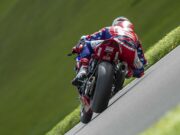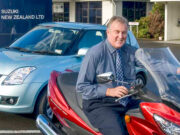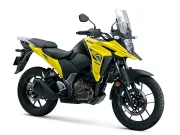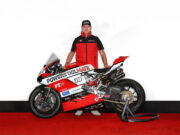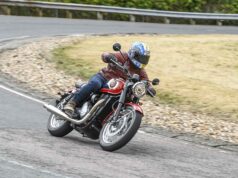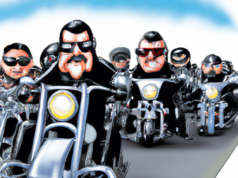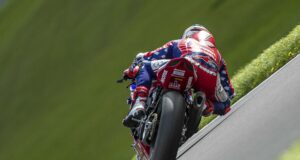Legendary Grand Prix crew chief Jeremy Burgess speaks about the circumstances behind his sudden departure from the MotoGP paddock and what he’s got planned for 2014 and beyond.
By Hamish Cooper
The four-hour drive from Valencia to Barcelona gives a man plenty of time to put 34 years of his life back into perspective.
As Jeremy Burgess powered along the Spanish toll-road alone in his rental Renault Megane on November 11, 2013, he quietly analysed the tumultuous events of the past few days.
“This wasn’t quite how I’d envisaged leaving Europe,” he says a few months later, sipping a Cooper’s Pale Ale beer in a quiet corner of his local pub in the hills behind Adelaide.
“I’d been preparing mentally for my retirement for years and have said before never to fear the moment because we all know from the first day we walk into a job that one day we’ll walk out for good.”
However, it was an enforced retirement for a man who first went to Europe on a whim in 1980 “to see the world”, then became an integral part of one of Grand Prix racing’s most successful teams.
The ink had only just dried on a Burgess one-year contract with Yamaha for 2014 when Valentino Rossi sacked him as crew chief.
Rather than attending the post-race testing sessions for season 2014 he was on his way to catch a final flight back to Australia, closing the curtain on his amazingly long career on the world stage of motorcycle racing.
Burgess working on his fence a couple years ago
Relaxed and Philosophical
“To me, as much as I wouldn’t have made such a call, the fact that the call has been made leaves me very much at ease,” Burgess says. “Having the one-year contract continue is not a bad thing. The more I get used to it (a year on full pay with no immediate responsibility) the more comfortable I become about it all.”
MotoGP’s final round at Valencia caught the motorcycle world’s imagination. Spanish teenager Marc Marquez was poised to become an unlikely world champion in his rookie year. Wily defending champion Jorge Lorenzo was planning a desperate last-ditch defence. But the big news was MotoGP folk hero Valentino Rossi’s very public divorce from “JB”, the straight-shooting crew chief who had guided him to seven of his nine world championship titles.
From the outside it seemed like a spur-of-the-moment decision handled in an embarrassingly clumsy way – Burgess sees it differently.
“Certainly I was blindsided by the timing of the decision, as I said at the time, but there was a basic difference between the way Valentino and I intended to continue on in MotoGP,” he says.
“He was keen to continue to perhaps 2016-2017 and we discussed this but I was not prepared to commit so far ahead.
“I was more than happy with a year-by-year contract so he probably felt a lack of commitment. I thought that, for me, it was the honest way to go forward.”
Rumours had been swirling around the Italian media in the lead-up to Valencia, forcing Rossi into making the announcement nobody wanted to believe on the Thursday before the race. Surely that made the last MotoGP a bitter-sweet occasion for Burgess?
“Not at all,” he says. “It would have been terrible to have run that last race and then had Valentino call me aside and say, ‘thanks, but I’ll see you later’.”
Burgess says he called the press conference after Rossi’s Thursday’s statement to clear the air.
“I didn’t want a trail of reporters tapping on the back of the shed all weekend to get my side of things,” he says.
That left Burgess free to concentrate on his last race with Rossi. Sadly, it pretty much summed up the season.
“When Lorenzo slowed the race down I hoped Valentino would be able to seize the chance and add another dimension by providing Marquez with a challenge he wasn’t expecting,” says Burgess.
But Rossi was unable to help his team-mate defend his points tally and remained stuck in a tight little group of Honda Gresini’s Alvaro Bautista and Marquez’s Honda team-mate Dani Pedrosa.
When Pedrosa dispatched Rossi and Bautista, Lorenzo realised he was on his own and no-one could stop Marquez cruising to a world title as the youngest-ever champion and the first rookie winner since Kenny Roberts in 1978.
Burgess working on his vintage Jag (note beer cartons in the corner)
Winning Above All Else
Burgess elaborates on another major difference that has developed between him and Rossi.
“Valentino loves the whole process of going racing and enjoys the riding almost as much as winning,” he says.
“To me it’s all about winning so to stay there in MotoGP to go through that experience of not winning is a vastly different world to what I’ve lived in for the past 34 years.
“My attitude has always been if you are not going to win stay home. During our time with Ducati I often felt we weren’t even in the same race as the top three.
“A lot of European MotoGP technicians consider racing is a job but to me and all the Aussies I know who work over there the motivation is winning.
“If I just wanted to be involved in racing I wouldn’t have to leave South Australia. I could go out to Mallala and watch a rider go around in a local event. The skills level might be different but it all equals itself out and even at a lower level than MotoGP it’s still great racing to watch.
“No, there are a lot of people who race and enjoy it but for me it’s all about winning.”
Not Looking Back
So why didn’t Burgess stay on and work with another young rider, such as Pol Espargaro, the Moto2 champion tipped to have a huge future?
Again, Burgess answers the question in a way you know it’s a subject he’s been pondering.
“Once I was a father figure to a young rider, now I’m more like a grandfather figure,” he says.
“Look, after 34 years I’m very comfortable with where I am and what I’ve achieved. The journey (with a rookie MotoGP rider) can be long, maybe five to seven years.”
What obligations does Burgess have to Yamaha, who have him on ice this season?
“I’ve received no indication that either Yamaha Europe or Yamaha Japan want me to do anything,” he says.
“You never know. I may get the call to plug a hole as the season unfolds but any role offered would have to be something both Yamaha and I agree upon.”
So how does it feel in the early days of retirement?
“This time of the year feels like every other since I first starting doing this job. Nothing happens until the first week of February (pre-season testing),” he says.
“The only difference is that moment of dread that we all get when we know we have to head off again to work, is absent.
“Actually, I used to enjoy the huge amount of air travel. I found all those years up the front of the plane reading books for hour after hour quite calming.
“I’ll miss being around the technology of MotoGP but I’m not sure if I’m even going to watch it live on television. I’ll probably tune into qualifying and then watch the race afterwards at my leisure.
Retirement
“I am a little apprehensive about winter as I haven’t lived through one since 1979. I’ve always been in the northern and then southern summers.”
So how does a MotoGP workaholic fill in his early days of retirement?
“There are plenty of little jobs around the place (he lives on a small rural property) that I never got around to finishing but I start every day with a long dawn walk,” he says.
“Every Friday I play a round of golf – just for fun as I haven’t played for over 10 years. On Saturday I play tennis for a few hours and on Sunday I rest.
“Oh, I’m planning to spend more time at my local motorcycle club and people have been pestering me to get a road motorcycle.
“Then there are the classic cars. The Mk II Jaguar is pretty much finished but the Triumph TR4 needs going over now.
“It’s also great just spending more time with the kids (his daughters are teenagers now) and Claudine (his wife).”
Burgess drains his beer and prepares to head off home in his early ‘90s Land Cruiser that he describes as “the last of the ‘real’ 4WDs”.
Unlike that last drive out of Europe, today JB has more simple issues on his mind. Chief among them is where he’s going fit the new bushfire hose reel to his shed and how he’s going to plumb up the hydrant.
JB ON ROSSI’S AGE AND NOT WINNING:
“Does not winning tarnish the image? Look at Barry Sheene. He won his two world titles in 1976 and 1977 and was still racing in 1984. That answers your question but at the age of 35 Rossi won’t be gaining many new fans this season. Right now the 10-year-olds are putting Marc Marquez posters up on their bedroom walls.”
JB ON MARC MARQUEZ’S RAPID RISE:
“He’s raced through the junior ranks to earn experience and learned a lot from watching Valentino Rossi. Look at the overtaking carbon-copy move at Laguna Seca’s corkscrew. Valentino likes him and I think he’d be happy to hand over the mantle of popularity to him.”
JB ON BEING AN OUTSPOKEN MOTOGP INSIDER:
“As Carmelo Espeleta (Dorna CEO) and I said the day I left, we haven’t always agreed but that fact alone shows we’re both thinking about MotoGP.”
JB ON CRT RACING:
“For too long the Grand Prix senior class has been the same scenario: Honda, Yamaha and a bit of Suzuki. CRT did a wonderful job showing chassis could be made in Europe. It created mini-industries and took us back to the interesting era of the 1960s-70s.”
Burgess earlier this year
JB ON ROSSI’S FIRST-UP WIN WITH YAMAHA:
“We (Rossi, JB and his team of technicians) came in with the confidence of winning. A lot of the European Yamaha technicians were in awe of Honda but we knew Honda inside out and also knew that in a lot of areas the Yamaha was actually better.”
JB ON HOW HE SAW THE ROSSI PARTNERSHIP CONTINUING:
“My long-term focus in 2013 was to stay with Valentino and help him out as long as I thought I was doing a good job. I wanted to get him out of the sport in good physical condition with all limbs intact, etc.”
JB ON AUSTRALIA’S MOTOGP LEGACY:
“I’m proud to have been part of the Wayne Gardner world title that brought the impetus to Phillip Island being able to host a world round, as well as being involved in more than 160 Grand Prix wins. I admire SBS for covering the sport and then Channel Nine for taking it off them, confirming the commercial value of it. Then along came Doohan and Stoner. By then Australians had embraced a truly world sport. We host MotoGP, F1 cars, world surfing at Bells and the Open tennis and golf. Forget cricket and rugby test series between two or three nations, these are the truly international sports we host.”



